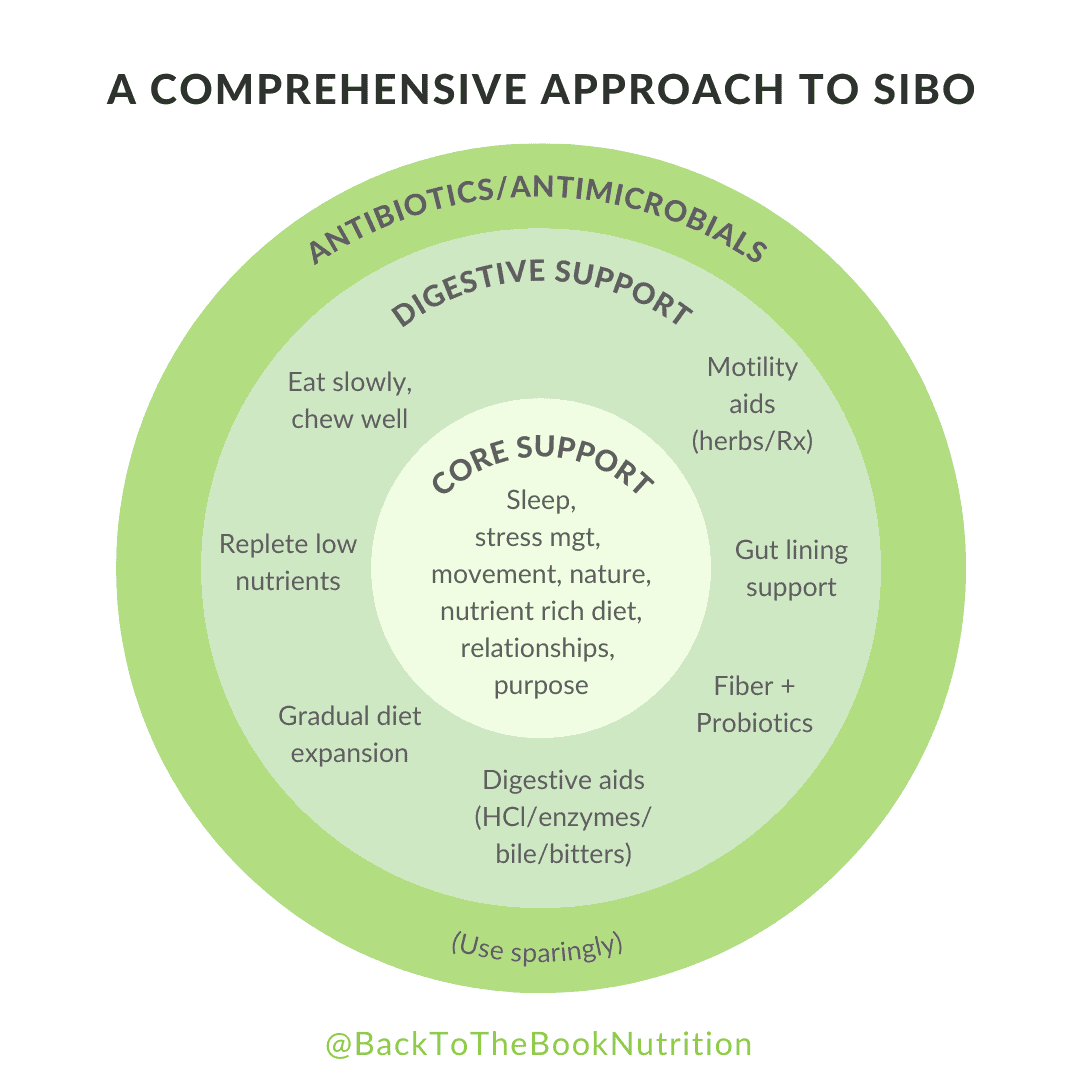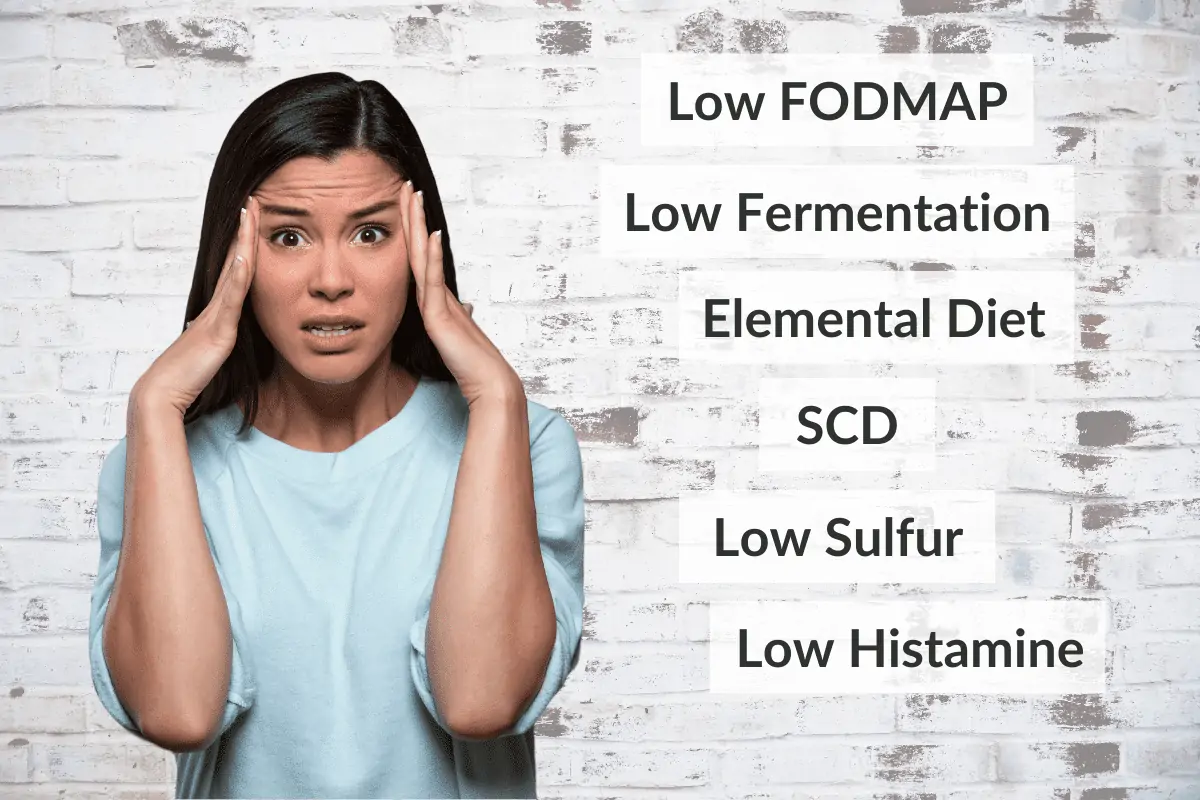What is SIBO, how to know if you have it, and how do you fix it for good? We cover all the latest research and recommendations for testing, popular SIBO diets, antibiotics vs. supplements, and more!
Note from Dena: I’m excited to share this guest post on such an important topic. It was co-written by Marla Ramos, Dietetic Intern, as part of a research partnership between Back To The Book Nutrition and post-graduate nutrition students from the University of Houston.
Bloating. Gas. Abdominal pain. Belching. Diarrhea. Constipation.
We all suffer from these from time to time, but if you’re one of many people who are experiencing one or more of these symptoms on a weekly – or even daily – basis, you may have SIBO. In fact, if you’ve been diagnosed with Irritable Bowel Syndrome (IBS), SIBO is even more likely (Source).
What is SIBO?
SIBO stands for Small Intestinal Bacterial Overgrowth, and has traditionally been thought to occur when either too many or the wrong type of bacteria multiply in the small intestine. I believe this overemphasis on the overgrowths in SIBO is why the traditional approach of repetitive rounds of antibiotics (or herbal antimicrobials) fail.
A more accurate understanding of SIBO is that there are imbalances in the small intestine, and in the gut overall. In fact, many studies show that what what causes SIBO symptoms is not the of bacterial overgrowth. Rather, not having enough bacterial variety in the small intestines is the problem (Source). This is critical for understanding how to fix SIBO.
3 MAIN TYPES OF SIBO
- Methane-Predominant SIBO – Caused by archaea (not technically bacteria) that produce primarily methane, giving rise to constipation, which is why this form is sometimes called SIBO-C.
- Hydrogren-Predominant SIBO – Caused by bacteria that produce hydrogen, which is sometimes associated with diarrhea or loose stools. Hence, this form is sometimes referred to as SIBO-D, though some with this form of SIBO do not have loose stools.
- Hydrogen Sulfide SIBO – a newer classification of SIBO where bacteria produce hyddrogen sulfide gas. This type of SIBO is often marked by very foul, sulfur-smelling gas and diarrhea, sometimes made worse by sulfur containing foods, supplements, and medications.
What Causes SIBO?
The root causes of SIBO are still being understood, but it seems as though risk factors are similar to those for other gut disorders.
Contributors to SIBO
- Stress
- Sleep disturbances (not getting enough sleep, difficulty falling/staying asleep, mouth breathing, etc.)
- Inflammation
- Poor immune function
- Low stomach acid, digestive enzymes, and/or bile
- Eating too quickly, not chewing well
- Standard American Diet (processed foods, high sugar, low fiber, pesticides, chemicals)
- Restrictive diets (not eating enough, extremes in macronutrients or fiber, possibly even Low FODMAP or other restrictive SIBO Diets) (Source)
- Low motility (slowed passage of digested food through the small intestines, whether from low thyroid function, nervous system dysfunction, neurotransmitter imbalances, or various other reasons).
- Infections – foodborne illness can trigger SIBO, but chronic infections may also contribute
- Medications that disrupt microbial balance – antibiotics, PPIs, opioids, etc.
- Anatomical changes in the small intestine due to disease states (i.e., stricturing from Crohn’s disease, adhesions from endometriosis, etc.)
This may not sound like a big deal. But it can wreak havoc on the GI system and, if it isn’t treated, can lead to other health complications.
Health Complications Related to SIBO
- Heartburn and Reflux
- Anemia (due to iron or vitamin B12 deficiency)
- Weight loss (due to malabsorption)
- Irritable Bowel Syndrome (78% have SIBO)
- Rosacea (46% have SIBO)
- Fibromyalgia (100% have SIBO)
- Obesity (41% have SIBO)
- Leaky Gut (since the overgrowth of bacteria can wear away the gut lining)
- Food Sensitivities caused by leaky gut
- Inflammatory Bowel Disease (Crohn’s, Ulcerative Colitis) (8-12 X higher SIBO rates)
- Nutrient deficiencies
- Osteoporosis
- Diabetes (SIBO 25% and 30% more likely in Type 1 and Type 2, respectively vs controls)
- Neuropathy
- Night blindness
How Do I Know if I Have SIBO?
If you have any of the following symptoms and are not getting better with treatment or diet changes, you may have SIBO.
- Bloating, especially after eating – this often accumulates throughout the day, then resolves overnight
- Excessive Gas
- Abdominal Pain
- Excessive Belching
- Diarrhea
- Constipation
- Fatigue
- Depression or Anxiety
- Rash
- Eczema
How to Test for SIBO
Currently, there is no perfect test for SIBO. Scientists are hard at work exploring more accurate testing methods, but these are the most common currently:
- 3-hour Lactulose breath test – at-home or in-office test, must be ordered by a doctor, dietitian, or other licensed practitioner. This has been heavily questioned by both conventional and holistic providers due to recent studies showing high false positive and negative rates. Many providers have abandoned it.
- Glucose breath test – at-home or in-office test, can be ordered by patient, but likely also has too many false positive/negatives to rely on it entirely.
- Hydrogen-Sulfide breath test – The “Trio Smart” SIBO breath test to identify Hydrogen Sulfide SIBO as well as Methane-Predominant and Hydrogen-Predominant SIBO in a single test. Has not been as extensively studied so time will tell whether there are similar concerns to other breath testing methods.
- GI MAP or other comprehensive stool testing – These cannot diagnose SIBO, but do help identify potential root causes of SIBO (insufficient digestive juices, low gut immune function, dysbiosis, etc.) This is my first preference because of the breadth of information it gives us about the overall gut environment, all of which need to be addressed for lasting SIBO results.
Note: This post contains affiliate links. By making purchases through these links, you pay the same amount for products, but a small portion of the sale will be sent my way to help with blog expenses. Thanks!
I Have SIBO – How Do I Treat It?
The most important thing to keep in mind is that SIBO isn’t just a single infection needing a single treatment. So just taking antibiotics and going back to living your life will not work in most cases.
SIBO is an imbalance that likely developed over months or years due to multiple factors. And, if you want lasting relief, you’ll need to devote several months to addressing all of the contributors in a holistic way using a combination of the diet, supplements, lifestyle, and medications outlined below.
Conventional Medical Treatments for SIBO:
Antibiotics, two in particular, have shown to have great results in the treatment of SIBO. These appear to be more effective in the small intestine, have less “collateral damage” in other parts of the gut, and to be less likely to promote antibiotic resistance like traditional antibiotics do.
- Rifaximin (brand name Xifaxan) for Hydrogen-predominant SIBO (Source)
- Rifaximin + Neomycin combination for Methane-predominant SIBO (Source)
- Treatment for Hydrogen Sulfide SIBO hasn’t been well established, but a combination of the above plus bismuth (Pepto Bismol/Kaopectate) seem to be the most promising medication approach to date.
Prokinetic agents (such as Metoclopramide) are often given alongside antibiotics to help move things through the gut more quickly and reduce risk of feeding the bacteria.
Natural Therapies for SIBO:
First and foremost, don’t jump right to killing microbes!
Killing may be needed, but I find it best to incorporate some or all of these to supporting overall digestive health. These can be used first or alongside antibiotics or herbal antimicrobials if needed.
- A diet rich in a variety of plant fibers as well as animal foods with limited sugar and processed foods (more below)
- Stress management
- Get great sleep
- Digestive bitters
- Betaine HCl
- Digestive Enzymes
- Ox bile
- Natural motility agents (ginger, artichoke, L-tryptophan, etc.)
If you prefer not to take prescription antibiotics, a recent study showed herbal antimicrobial therapies may work just as well, and usually with fewer side effects. Keep in mind that methane, hydrogen, or hydrogen sulfide dominance may alter which are most effective.
- Allicin (Garlic)
- Berberine
- Oregano
- Olive leaf
- Neem
- Cinnamon
- Cat’s Claw
- Atrantil (blend of several botanicals) – Works best on methane-predominant SIBO.
Prebiotics and Probiotics for SIBO:
Recent studies have shown that prebiotics and probiotics may be an effective alternative to antibiotics in treating SIBO or, at the very least, can improve outcomes when added to antibiotics. (Source) A 2018 meta-analysis evaluated 18 studies and concluded that probiotics didn’t help prevent SIBO but did effectively treat SIBO and significantly reduced symptoms. (Source)
My experience with clients has been mixed, so you may have to do some trial and error with various probiotic blends to determine whether they’re helpful for you.
Download your free Ultimate Guide to Probiotic Supplements here!
Popular SIBO Diets (short term use only):
Several different diets recommended for SIBO are listed below. These can reduce symptoms for some, but no studies to date have shown that a diet can resolve overgrowth/dysbiosis. Basically, they can help you feel better but aren’t fixing the actual problem.
Restrictive diets are also difficult to maintain, can promote unhealthy food relationships, increase risk for nutrient deficiencies, and may even perpetuate gut imbalances that give rise to SIBO. (Source)
It’s best to work with a registered dietitian to help determine whether a particular “SIBO diet” is best for you, and to help you with a personalized plan for gradual reintroductions as your symptoms improve. (Sources: 1, 2)
- Low FODMAPs Diet
- Specific Carbohydrate Diet (SCD)
- Gut and Psychology Syndrome Diet (GAPS)
- SIBO Specific Diet
- Elemental Diet (a fully digested liquid diet intended for short term use)
- Cedars-Sinai Diet (Less restrictive and developed by Dr. Pimentel, a prominent SIBO resaercher)
More info on each of these SIBO diets can be found here.
If you’ve already been through one or more rounds of the restrictive SIBO diets and antibiotics/antimicrobials above, you may gain more benefit from improving digestive juices and motility, while gradually expanding your diet to include more variety again. This can be a slow and frustrating process, and having a professional to guide you can help immensely.
Fecal Microbiota Transfer (FMT) for SIBO?
More study is needed here, but early research is promising. A 2021 placebo controlled study showed FMT significantly improved SIBO symptoms and improved lactulose breath test results compared to placebo. Stool samples in the subjects also showed improved microbial diversity, which is a great reflection of large intestinal gut health though not necessarily reflective of microbes in the small intestine.
Will My SIBO Come Back?
Unfortunately, our understanding of SIBO and how to effectively treat it is still evolving. Even with effective treatment, SIBO has a recurrence rate of 44%. (Source) Again, I believe this dismal statistic has a lot to do with the fact that killing overgrowths has been the almost exclusive approach to SIBO until more recently.
To reduce the risk of recurrence, it’s important to use antibiotics and antimicrobials judiciously, to use SIBO specific antibiotics when needed, address the more global gut dysfunctions listed above, and to eat a plant rich diet that feeds a diverse microbiome.
Steps to Reduce Risk of SIBO Recurrence
- Eat slowly and chew well.
- Eat a nutrient dense diet with as broad a variety of plant foods that you can tolerate.
- Gradually incorporate/increase fermented foods.
- Minimize intake of inflammatory foods like processed vegetable oils, refined foods, and added sugars.
- Eat enough protein, ideally from bioavailable sources like meats, poultry, fish, and eggs.
- Keep blood sugar balanced.
- Manage stress.
- Get adequate sleep.
- Exercise regularly, but not excessively.
- Consider digestive support supplements (Hcl, enzymes, bitters, etc.).
- Avoid unnecessary antibiotics, PPIs, NSAIDs, opioids, and other medications that disrupt gut flora and have been linked to SIBO.
- Consider regular probiotic use.
Get Help with SIBO Today!
Want a holistic approach to overcome SIBO? I’d love to help! Schedule a free, 10 minute Discovery call and let’s talk details!
Schedule your free, 10 minute call now!
About the co-author: Marla Ramos is a Dietetic Intern, with a B.S. in Human Nutrition and Foods from the University of Houston. She has a particular interest in gut health due to her own personal experience with Crohn’s Disease.
Disclaimer: Information on this site is intended only for informational purposes and is not a substitute for medical advice. Always consult with a trusted healthcare provider before implementing significant dietary change. Read additional disclaimer info here.







I never knew any of this and have never heard of SIBO! This was extremely informative and super helpful!
Hihi….am I the only one here that wishes doctors explained loose stool or diarrhoea this easily? You have clearly schooled me!
I’m glad it was helpful, Ntensibe!
I never heard of this before, and thanks for sharing this info. I’m not sure if I have SIBO but best to check and know my diet.
This is the first time I heard about SIBO. It stands for Small Intestinal Bacterial Overgrowth. Wow! I learned a lot from this article.
I think I’ve heard a friend mention this and it’s great that I get to know more about it through this post. Those are some great points to keep in mind.
This is the first time I’ve heard of SIBO before and I learned tons of new things in this article. Will keep this in mind.
Wow wow wow, such an in-depth article. I love it. I will save it for spring when I’ll start my diet again.
If I had never discovered this post, I do not think I would have ever learnt about SIBO. Thank you for creating this comprehensive medical guide. I have rated it 5/5.
I hadn’t heard of SIBO before. Great to know all this information now in case I ever have the symptoms or know someone that has it.
Woooow, I had no idea about this at all. This is such an informative blog post. I thank you you teaching me something new and important.
I am glad that you found it useful Farah. Thanks for commenting!